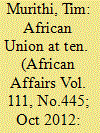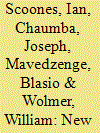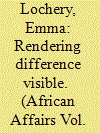|
|
|
Sort Order |
|
|
|
Items / Page
|
|
|
|
|
|
|
| Srl | Item |
| 1 |
ID:
115836


|
|
|
|
|
| Publication |
2012.
|
| Summary/Abstract |
AS THE AFRICAN UNION MARKED ITS TENTH ANNIVERSARY on 9 July 2012, it was still recovering from one of its most public disagreements. At the heart of this disagreement was the AU's interpretation of and commitment to good governance and humanitarian intervention. Sparked by the uprisings in Tunisia, Egypt, and Libya, and the contested November 2010 elections in Côte d'Ivoire, these issues came under intense debate. The NATO-led intervention in Libya - the AU's backyard - caught the organization unaware and divided its members on whether the military incursion, under the rubric of the UN doctrine of the 'responsibility to protect' (R2P), was warranted. Similarly, the earlier crisis in Côte d'Ivoire and the involvement of the UN and France led to criticisms of the AU's failure to respond in a unified and coherent manner.
|
|
|
|
|
|
|
|
|
|
|
|
|
|
|
|
| 2 |
ID:
115832


|
|
|
|
|
| Publication |
2012.
|
| Summary/Abstract |
Kenya's enduring ethnic violence is frequently explained with reference to the mobilization of ethnicity from above, and relatively little attention has been paid to the participation of ordinary people. Focusing on the violence that followed the 2007 general elections, this article explores how bottom-up processes of identification and violence interacted with incitement from above. It argues that autochthonous discourses of belonging and exclusion engendered an understanding of ethnic others as 'immigrants' and 'guests', and these narratives of territorialized identity both reinforced elite manipulation and operated independently of it. Kenya's post-election violence can thus be understood as a bottom-up performance of narratives of ethnic territorial exclusion operating alongside more direct elite involvement, organization, and incitement. The durability of these narratives, as well as their inherent plasticity, has significant implications for the potential for further violence and the prospects for democratization.
|
|
|
|
|
|
|
|
|
|
|
|
|
|
|
|
| 3 |
ID:
115835


|
|
|
|
|
| Publication |
2012.
|
| Summary/Abstract |
Streets are sites of hegemony and counter-hegemony, of inclusion and exclusion, of incorporation and expulsion, and of cooperation or conflict. Thus, in the cultural geography of cities, commemorative street names are critical sites of social reproduction. Commemorative street naming is both an historical referent as well as a spatial designation. Recent literature on toponymy calls attention to such practices as important cultural and political arenas for understanding socio-political processes, but often focuses on the politics and sociality of street naming within local, national politics to the exclusion of how local politics intersects with international politics. This article examines the politics of spatial inscription and the social reproduction of 'place' or 'space' on a street corner in New York City named after Kudirat Abiola, an assassinated woman activist in Nigeria, and the retaliatory renaming by the military regime of a Lagos street hosting the US Embassy after the African American anti-establishment activist Louis Farrakhan. Subsequently, the next democratic government of Nigeria renamed the street, this time after the US ambassador, the African American Walter Carrington. Toponymy, the article concludes, can thus be seen as a form of retortion in international relations.
|
|
|
|
|
|
|
|
|
|
|
|
|
|
|
|
| 4 |
ID:
115830


|
|
|
|
|
| Publication |
2012.
|
| Summary/Abstract |
This article explores the contests over land and resources in the lowveld of Zimbabwe, focusing on three case studies - Nuanetsi ranch, the Save Valley and Chiredzi River conservancies, and Gonarezhou National Park. Each case examines who gained and who lost out over time, from entrepreneurial investors to well-connected politicians and military figures, to white ranchers and large numbers of farmers who have occupied land since 2000. We identify a dynamic of elite accumulation and control over resources that has been resisted by alliances of land invaders, war veterans, and local political and traditional leaders. By documenting this struggle over time, the article demonstrates that, in these marginal areas outside the formal 'fast-track' land reform programme, local communities retain the capacity to resist state power and imagine alternative social, economic, and political trajectories - even if these are opposed by those at the centre. While much discussion of recent Zimbabwean politics has appropriately highlighted the centralized, sometimes violent, nature of state power, this is exerted in different ways in different places. A combination of local divisions within political parties, bureaucratic discretion within implementing agencies, and local contests over land create a very particular, local politics, especially at the geographic margins of the nation. As this article shows, this offers opportunities for a variety of expressions of local agency and resistance, which temper the impositions of centralized state power.
|
|
|
|
|
|
|
|
|
|
|
|
|
|
|
|
| 5 |
ID:
115834


|
|
|
|
|
| Publication |
2012.
|
| Summary/Abstract |
This article examines the history of Somalis in Kenya. It argues that the precarious citizenship status of Kenyan Somalis is rooted in the institutionalization of state power in Kenya and the ways in which social relations have mediated that power. It focuses on a screening exercise organized by the Kenyan government in 1989 to differentiate citizens from non-citizens. Somalis deemed non-citizens were detained and deported while those declared citizens were granted pink 'certificates of verification'. The exercise was framed as a response to disorder and insecurity in northern Kenya - problems blamed on the increased presence of 'aliens' from Somalia. The 1989 screening is a useful lens for understanding how the institutions of the Kenyan state have negotiated and produced citizenship. First, the screening shows how citizenship is an arena for both inter- and intra-ethnic competition; the way specific social relations are embedded within the structures of the state affects the distribution of rights and resources among different groups of citizens. Second, the organization of the screening reveals that public debates about citizenship in Kenya have not just been about drawing lines between insiders and outsiders, but about which insiders belong to which territorial spaces.
|
|
|
|
|
|
|
|
|
|
|
|
|
|
|
|
| 6 |
ID:
115833


|
|
|
|
|
| Publication |
2012.
|
| Summary/Abstract |
The practice of misappropriating and stealing huge sums of public money under the guise of enhancing national security has come under increasing scrutiny in Nigeria. This article investigates the history and practice of the use of so-called security votes, and shows how the ambiguity and secrecy associated with the concept of national security has helped institutionalize unaccountable governance at all levels of government. Tracing the use and abuse of security votes from the military regime of General Babangida to the present democratic era, the article argues that the misappropriation of security votes has expanded in recent years. It suggests that the problem is rooted in the rentier nature of the Nigerian state, not in the inadequacy of fiscal rules, and concludes that it will remain difficult for citizens to hold their leaders to account as long as the country continues to depend on oil rents.
|
|
|
|
|
|
|
|
|
|
|
|
|
|
|
|
| 7 |
ID:
115831


|
|
|
|
|
| Publication |
2012.
|
| Summary/Abstract |
This article explores the production of post-apartheid Afrikaner identity in South Africa. Centred around the private sphere of the braai, the article draws on discursive psychology to investigate the participants' dilemmas and struggles over their identity as Afrikaners, South Africans, and Africans, and the ways in which these identities are being redefined. The 'backstage' talk that is usually reserved for fellow whites or Afrikaners illustrates a clear difference between public and private constructions of Afrikaner identity. While the participants rejected many stereotypes of Afrikaner identity, they simultaneously recycled key discourses underlying apartheid ideology, particularly discourses of black incompetence and whites under threat. Participants generally claimed status as 'Africans' but strongly resisted assimilation with 'Africa' or a broader African identity. The article concludes that the construction of the Afrikaner community as embattled and systematically oppressed might provide powerful support for extremism.
|
|
|
|
|
|
|
|
|
|
|
|
|
|
|
|
|
|
|
|
|